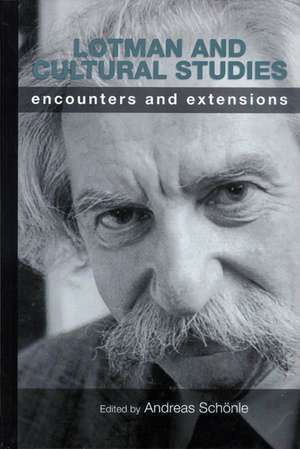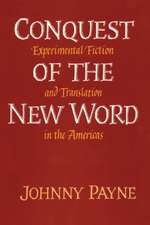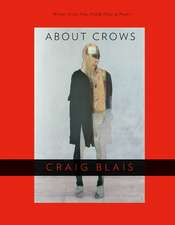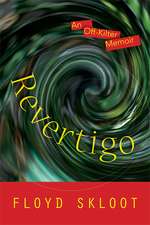Lotman and Cultural Studies: Encounters and Extensions
Editat de Andreas Schonleen Limba Engleză Hardback – 2 noi 2006
One of the most widely read and translated theorists of the former Soviet Union, Yurii Lotman was a daring and imaginative thinker. A cofounder of the Tartu-Moscow school of semiotics, he analyzed a broad range of cultural phenomena, from the opposition between Russia and the West to the symbolic construction of space, from cinema to card playing, from the impact of theater on painting to the impact of landscape design on poetry. His insights have been particularly important in conceptualizing the creation of meaning and understanding the function of art and literature in society, and they have enriched the work of such diverse figures as Paul Ricoeur, Stephen Greenblatt, Umberto Eco, Wolfgang Iser, Julia Kristeva, and Frederic Jameson.
In this volume, edited by Andreas Schönle, contributors extend Lotman's theories to a number of fields. Focusing on his less frequently studied later period, Lotman and Cultural Studies engages with such ideas as the "semiosphere," the fluid, dynamic semiotic environment out of which meaning emerges; "auto-communication," the way in which people create narratives about themselves that in turn shape their self-identity; change, as both gradual evolution and an abrupt, unpredictable "explosion"; power; law and mercy; Russia and the West; center and periphery.
As William Mills Todd observes in his afterword, the contributors to this volume test Lotman's legacy in a new context: "Their research agendas-Iranian and American politics, contemporary Russian and Czech politics, sexuality and the body-are distant from Lotman's own, but his concepts and awareness yield invariably illuminating results."
In this volume, edited by Andreas Schönle, contributors extend Lotman's theories to a number of fields. Focusing on his less frequently studied later period, Lotman and Cultural Studies engages with such ideas as the "semiosphere," the fluid, dynamic semiotic environment out of which meaning emerges; "auto-communication," the way in which people create narratives about themselves that in turn shape their self-identity; change, as both gradual evolution and an abrupt, unpredictable "explosion"; power; law and mercy; Russia and the West; center and periphery.
As William Mills Todd observes in his afterword, the contributors to this volume test Lotman's legacy in a new context: "Their research agendas-Iranian and American politics, contemporary Russian and Czech politics, sexuality and the body-are distant from Lotman's own, but his concepts and awareness yield invariably illuminating results."
Preț: 306.77 lei
Nou
Puncte Express: 460
Preț estimativ în valută:
58.72€ • 63.80$ • 49.36£
58.72€ • 63.80$ • 49.36£
Carte disponibilă
Livrare economică 31 martie-14 aprilie
Preluare comenzi: 021 569.72.76
Specificații
ISBN-13: 9780299220402
ISBN-10: 0299220400
Pagini: 394
Ilustrații: 10 b-w photos, 15 b-w illus.
Dimensiuni: 152 x 229 x 25 mm
Greutate: 0.65 kg
Ediția:1
Editura: University of Wisconsin Press
Colecția University of Wisconsin Press
ISBN-10: 0299220400
Pagini: 394
Ilustrații: 10 b-w photos, 15 b-w illus.
Dimensiuni: 152 x 229 x 25 mm
Greutate: 0.65 kg
Ediția:1
Editura: University of Wisconsin Press
Colecția University of Wisconsin Press
Recenzii
"Adding Lotman's views to the modern intellectual landscape opens up alternative paths in the exploration of the fabric of culture. All the contributors to this volume rise successfully to this formidable challenge, and their collective contribution is truly outstanding in regard to both the richness of its content and the coherence and clarity of its general message."—Boris Gasparov, Columbia University
“Every one of the essays included in this volume demonstrates the wide range of the applicability and the power of Lotman’s ideas for the study of both textual and nontextual cultural phenomena.”—Edna Andrews, Slavic Review
Notă biografică
Andreas Schönle is professor of Russian studies at Queen Mary, University of London.
Descriere
One of the most widely read and translated theorists of the former Soviet Union, Yurii Lotman was a daring and imaginative thinker. A cofounder of the Tartu-Moscow school of semiotics, he analyzed a broad range of cultural phenomena, from the opposition between Russia and the West to the symbolic construction of space, from cinema to card playing, from the impact of theater on painting to the impact of landscape design on poetry. His insights have been particularly important in conceptualizing the creation of meaning and understanding the function of art and literature in society, and they have enriched the work of such diverse figures as Paul Ricoeur, Stephen Greenblatt, Umberto Eco, Wolfgang Iser, Julia Kristeva, and Frederic Jameson.
In this volume, edited by Andreas Schönle, contributors extend Lotman's theories to a number of fields. Focusing on his less frequently studied later period, Lotman and Cultural Studies engages with such ideas as the "semiosphere," the fluid, dynamic semiotic environment out of which meaning emerges; "auto-communication," the way in which people create narratives about themselves that in turn shape their self-identity; change, as both gradual evolution and an abrupt, unpredictable "explosion"; power; law and mercy; Russia and the West; center and periphery.
As William Mills Todd observes in his afterword, the contributors to this volume test Lotman's legacy in a new context: "Their research agendas-Iranian and American politics, contemporary Russian and Czech politics, sexuality and the body-are distant from Lotman's own, but his concepts and awareness yield invariably illuminating results."
In this volume, edited by Andreas Schönle, contributors extend Lotman's theories to a number of fields. Focusing on his less frequently studied later period, Lotman and Cultural Studies engages with such ideas as the "semiosphere," the fluid, dynamic semiotic environment out of which meaning emerges; "auto-communication," the way in which people create narratives about themselves that in turn shape their self-identity; change, as both gradual evolution and an abrupt, unpredictable "explosion"; power; law and mercy; Russia and the West; center and periphery.
As William Mills Todd observes in his afterword, the contributors to this volume test Lotman's legacy in a new context: "Their research agendas-Iranian and American politics, contemporary Russian and Czech politics, sexuality and the body-are distant from Lotman's own, but his concepts and awareness yield invariably illuminating results."














